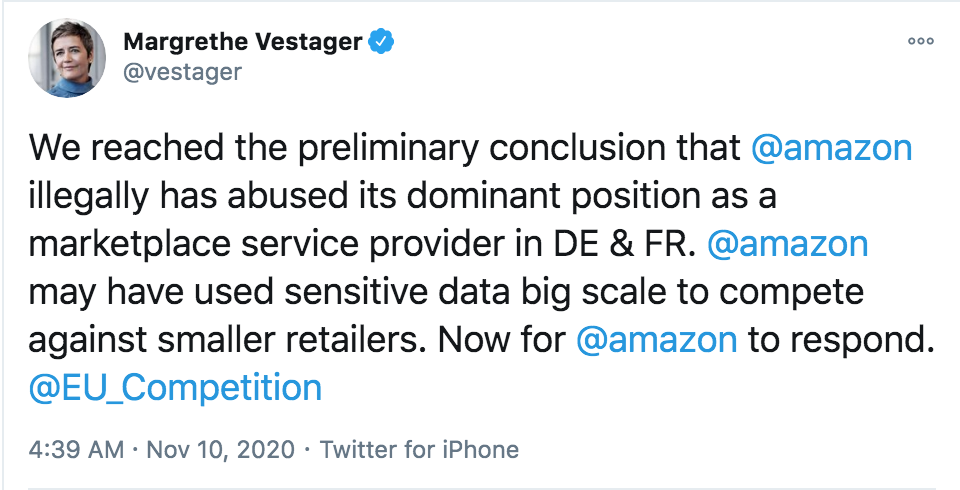Earlier this week the European Commission found that Amazon has been breaking antitrust rules on its French and German websites.
Executive Vice President Margrethe Vestager, the E.U. commissioner in charge of competition, said the way Amazon uses third party sellers' data "marginalizes third-party sellers and caps their ability to grow.” Specifically, the finding claims that Amazon uses "very large quantities of non-public seller data" to help it improve its own business "to the detriment of the other marketplace sellers." This summer, Amazon faced similar charges from the United States Congress.

In a statement, Amazon responded that it disagrees with the European Commission's findings.
What Amazon Does to Third-Party Sellers
I will tell you straight up that Amazon does do these practices. It does use sellers' own data against them. Once you get to be a certain size, Amazon starts attacking you. While it may not be "proven" as in a court of law—Amazon is not stupid; they know how to cover their tracks— I have heard so many horror stories. It goes like this:
You hit the jackpot, you start to get really good traffic in Amazon, a very high volume of sales. Amazon sees how much traffic you are bringing in. Because Amazon has all the data on your customers and your brand, they look at it and then do two things:
Inform the rest of the marketplace. If you sell diapers and do really well, Amazon will tell other sellers, "Hey, diapers are really hot right now, you should start selling diapers."
If you are growing really fast and even the other marketplace sellers can't keep up, then Amazon creates an Amazon Basics version of the item, and starts recommending their own product in search listings over yours.
Keep in mind that the opposite scenario is true as well: If a product is not doing well, Amazon knows not to get in there. Imagine having that kind of power. This is why Amazon is so powerful.
If you look at the terms and service, you will see that anything that goes through their platform is their data. As a seller, this is like sleeping with your enemy. They know everything about you. I can just tell you, you don't want to give your data, your most precious asset to your enemy.
Is Selling on Amazon Worth It?

Running on Amazon is expensive. You're lucky if you are making a 50 percent profit margin. On top of that, there are a lot of hidden costs. On top of that, Amazon competes with you. At the same time, for nearly all e-commerce businesses, there is no choice but to sell on Amazon. It us an ugly truth but a truth nonetheless: If you're not on Amazon, people think you're not a credible brand.
Amazon is here to stay. You can’t say, “I don’t want to sell on Amazon.” It’s too late. You will die. You have to be able to play with the bear but not get mauled. So how do you do it? I have a couple strategies.
Find ways to connect with your customer
As much as possible, have a direct relationship with your customer. The tricky thing about this is that sellers are prohibited from contacting and marketing to customers that come to them from Amazon. I have a friend who sold usb cables on Amazon for eight years. His business grew every year and he was so successful from doing this that he was thinking of buying a house in Los Angeles. But he made a mistake. He tried to reach out to some of his customers, and Amazon found out. They terminated his seller account. It took him three years to sell his cables on ebay. He didn’t buy the house.
You have to be careful, but there are ways. With one of my clients who fulfills her own orders, we figured out a workaround. Though we do not contact customers, in the packaging we put a QR code that can be scanned to access the user manual for the product. This is absolutely fine by Amazon.
Exclusivity on your e-commerce store

Think about exclusivity. Put whatever products are your volume leaders on Amazon, but then create an exclusive line that’s only available on your company’s separate e-commerce store. Use Amazon as a discovery platform. New customers will find you there, but once they know about you, especially if their experience is good, it’s likely they will google you. If you do this effectively—be sure to keep products the same price as you as listing them on Amazon—customers may begin buying from you directly.
Be bold and be the best
Be incredibly bold. If you're willing to stand out, if you're creative, if you are not lazy, if you don't want to just spam people, then AI and data-driven practices can help you create a brand that truly stands out—without selling your soul to Amazon or any other company. If you do something totally different, something totally delightful, and you pair it with AI, you can be the first thing that customers think of when they search. You can be unstoppable.
Amazon is constantly changing their rules. Keeping up is ongoing work, and every business is different. If you would like to take it offline and schedule 15 minutes to chat with me directly about ideas for your business, contact me.